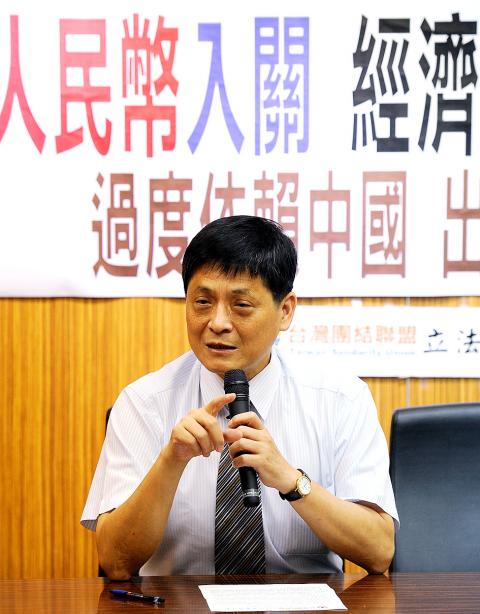Taiwan Solidarity Union (TSU) legislators yesterday questioned a plan by convenience store chain 7-Eleven to launch currency exchange services for the yuan, saying that it might lead to loss of Taiwan’s currency sovereignty.
As an increasing number of Chinese visitors come to Taiwan, 7-Eleven — which is operated by President Chain Store Corp (統一超商) — on Thursday announced that, starting tomorrow, it would provide currency exchange services for the yuan at three of its stores.
“Providing the service will facilitate the circulation of the yuan in Taiwan, which may allow the Chinese currency to actually affect consumer prices in the country,” TSU caucus whip Lai Cheng-chang (賴振昌) told a news conference at the caucus office.

Photo: Chu Pei-hsiung, Taipei Times
“This is no different from losing our sovereignty in terms of currency,” he said.
Lai said that since Chinese tourists are not the only foreign visitors in Taiwan, “why is [7-Eleven] only providing the service for the yuan?”
TSU Legislator Chou Ni-an (周倪安) said that in addition to worrying about the impact of the yuan in Taiwan, she is concerned with security and forgery issues.
“With large amounts of cash in yuan and NT dollars in store, will convenience stores have enough security measures? Also, there are a lot of forged banknotes in China — will the part-time staff at convenience stores be able to identify whether the banknotes are authentic?” Chou asked.
“Currency exchange services are available at a wide range of hotels and banks, so I doubt there is a need for convenience stores to provide such services,” she added.
Moreover, Lai said that, as China is trying to create the image that Taiwan and China are tied together, “this would give it a good opportunity to manifest that tie.”
However, 7-Eleven is not the first convenience store chain to provide such services. FamilyMart (全家便利商店) has been providing currency exchanges for yuan, US dollars, Hong Kong dollars and yen at designated stores.
Since a revision of the regulations on currency exchange in 2013, the government has allowed convenience store and drug store chains, as well as night markets, to provide “one-way” currency exchange services — meaning that foreign currency holders may change foreign currency cash into NT dollars at the newly added locations, but not the other way around.
Despite the TSU’s concerns, former Taiwan Association of University Professors president Lu Chung-chin (呂忠津) said he does not think 7-Eleven’s decision is a big issue.
“Chinese tourists have to change money anyway. If they cannot do it at convenience stores, they will have to do so at banks, airports or hotels. Besides being more convenient, there is actually not much of a difference,” he said.
In response to the lawmakers’ criticism, 7-Eleven said that its management is assessing the possibility of including other currencies.
It might extend the service to more branches located near famous tourist attractions, such as Kenting National Park in Pingtung County or night markets, 7-Eleven said.
The cashiers would receive trainings in currency exchange, including banknote identification, while counterfeit banknote detectors and exchange rate boards would also be installed at the branches offering the service, 7-Eleven said.
Additional reporting by Chen Wei-han and CNA

The CIA has a message for Chinese government officials worried about their place in Chinese President Xi Jinping’s (習近平) government: Come work with us. The agency released two Mandarin-language videos on social media on Thursday inviting disgruntled officials to contact the CIA. The recruitment videos posted on YouTube and X racked up more than 5 million views combined in their first day. The outreach comes as CIA Director John Ratcliffe has vowed to boost the agency’s use of intelligence from human sources and its focus on China, which has recently targeted US officials with its own espionage operations. The videos are “aimed at

STEADFAST FRIEND: The bills encourage increased Taiwan-US engagement and address China’s distortion of UN Resolution 2758 to isolate Taiwan internationally The Presidential Office yesterday thanked the US House of Representatives for unanimously passing two Taiwan-related bills highlighting its solid support for Taiwan’s democracy and global participation, and for deepening bilateral relations. One of the bills, the Taiwan Assurance Implementation Act, requires the US Department of State to periodically review its guidelines for engagement with Taiwan, and report to the US Congress on the guidelines and plans to lift self-imposed limitations on US-Taiwan engagement. The other bill is the Taiwan International Solidarity Act, which clarifies that UN Resolution 2758 does not address the issue of the representation of Taiwan or its people in

US Indo-Pacific Commander Admiral Samuel Paparo on Friday expressed concern over the rate at which China is diversifying its military exercises, the Financial Times (FT) reported on Saturday. “The rates of change on the depth and breadth of their exercises is the one non-linear effect that I’ve seen in the last year that wakes me up at night or keeps me up at night,” Paparo was quoted by FT as saying while attending the annual Sedona Forum at the McCain Institute in Arizona. Paparo also expressed concern over the speed with which China was expanding its military. While the US

SHIFT: Taiwan’s better-than-expected first-quarter GDP and signs of weakness in the US have driven global capital back to emerging markets, the central bank head said The central bank yesterday blamed market speculation for the steep rise in the local currency, and urged exporters and financial institutions to stay calm and stop panic sell-offs to avoid hurting their own profitability. The nation’s top monetary policymaker said that it would step in, if necessary, to maintain order and stability in the foreign exchange market. The remarks came as the NT dollar yesterday closed up NT$0.919 to NT$30.145 against the US dollar in Taipei trading, after rising as high as NT$29.59 in intraday trading. The local currency has surged 5.85 percent against the greenback over the past two sessions, central